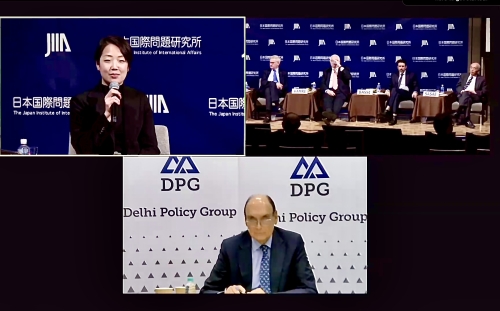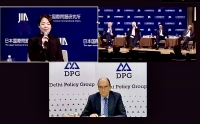The 5th JIIA Tokyo Global Dialogue
Date: February 29, 2024 | Time : 01:30 pm
The 5th JIIA Tokyo Global Dialogue
A World in Turmoil: How Can We Rebuild International Security and Cooperation?
February 28-29, 2024
Concluding Session: “The Future of International Security and Cooperation”
This session reflected on the discussions held at the Tokyo Global Dialogue, exploring how the international community can find a path to building international security and cooperation, along with proposing feasible policies in the context of medium to long-term international situation prospects.
Speakers:
- Justin Bassi, Executive Director, Australian Strategic Policy Institute (ASPI)
- Carl Bildt, Former Prime Minister of Sweden / Vice Chairman, Kreab Worldwide
- John J. Hamre, CSIS President and CEO, and Langone Chair in American Leadership
- Kenichiro Sasae, President, The Japan Institute of International Affairs / Former Ambassador of Japan to the U.S.
- Hemant Krishan Singh, Director General, The Delhi Policy Group (DPG) / Former Ambassador of India to Japan
Moderator: Michelle Ye Hee Lee, Tokyo Bureau Chief, The Washington Post
Remarks by Amb. H. K. Singh, Director General
I. Rebuilding International Security and Cooperation in midst of Poly-crises
- Good afternoon to my fellow panelists, and thank you Amb. Ken Sasae/JIIA for inviting me to join the Tokyo Global Dialogue for the fifth time.
- The question before us is: why is it proving difficult to rebuild international security and cooperation today? Let me suggest an underlying cause and a possible remedy.
- The US-led West has anchored the existing UN Charter-based global order since 1945, and still controls virtually all the critical levers of power.
- However, transgressions of this order have not only persisted, but have also multiplied post 1991, a period of the West’s ascendancy.
- The reality is that the West’s capacity to exercise unilateral power and influence is being contested in Europe, the Middle East, and Asia. It is struggling to secure desired outcomes. The West’s narratives are not winning over the Rest.
- And among the reasons for this fracture is that global power equations are not set in stone, and the balance is inexorably shifting from the Euro-Atlantic to the Indo-Pacific.
- A new global landscape, which is more multipolar, is emerging. The international community is obviously much wider than the G7, NATO and the collective West.
- It follows that broader convergence across an increasingly multipolar world will be difficult to achieve based on the presumption of Western dominance alone.
- Above all, it will require accommodation of emerging powers through meaningful reform of multilateral institutions tasked with security, development, and cooperation, consistent with contemporary and evolving realities. In my view, this would be in the interest of the West itself.
II. Global Instability & Role of Japan
- It is of course for Japan to determine its role in contributing to global stability. I can only offer some pointers and suggestions.
- Japan is currently a non-permanent member of the UNSC, and a leading contributor to development assistance. It is well-placed to make an impact on reviving multilateral cooperation, which has become increasingly ineffective and dysfunctional.
- To begin with, Japan can take the lead in ensuring that multilateral cooperation goes beyond security to focus meaningfully on economic progress and development, particularly of the most disadvantaged nations of the Global South.
- Next, selectivity and double standards are undermining global solidarity. Japan can help rebuild trust by championing uniform and transparent adherence to the core principles of the UN Charter and international law, which include not only territorial integrity, sovereignty and political independence, but also mutual and equal security.
- Furthermore, Japan can push for negotiated solutions to long standing problems that have been allowed to fester, based on the principles of international law, not unilateralism. The Palestine issue, for instance, has remained unresolved since 1948.
- It is clear that the pursuit of war cannot make the achievement of peace easier. The horrific wars of today are difficult to win on the battlefield; any resolution will involve a balance of interests. As a self-proclaimed pacifist nation, Japan needs to make its voice heard in favour of peace.
- Japan can bring dialogue and diplomacy centre stage. In a divided world, respecting various viewpoints provides the basis of cooperation. The guiding principle should be to engage, not set the agenda and dictate.
- If there is to be greater stability and balance in the global system, the heft and role of middle powers, Japan and India among them, needs to be given room.
- Japan today appears to be positioned more in support of Western primacy and victory in a European war than it is engaged in serving the future of a rising, multipolar Asia. We need Japan to be an important pillar of Asian security.
- Finally, with its traditional focus on normative order, I believe that Japan can help build a wider stake-holding across the international community in support of the UN Charter-based order that delivers both security and development.
III. Indo-Pacific
- It is now widely recognised that no region of the world will have a greater impact on the future of world order than Asia and the Indo-Pacific. This needs to be reflected in the key institutions of global decision-making, where Asia is under-represented.
- It is also critically important to remember that the Indo-Pacific is not the Asia Pacific: it includes the entire inter-connected oceanic space from East Asia to the Indian Ocean. Without India, there is no Indo-Pacific. The approach towards the Indo-Pacific needs to be holistic.
- The US-China standoff in East Asia is not new; it has been gathering momentum for over a decade. There are two factors in play here.
- First, while China’s rise was consciously enabled by the West, China never entered the tent of the US-led rules-based order as a “responsible stakeholder”. It seeks to dominate Asia, and eventually the world.
- And second, China’s expansionist designs, in the East China Sea or the South China Sea, have met with mild resistance. The only exception is India’s resolute pushback against China’s military aggression in the Himalayas.
- China, as a result, does not see itself bound by any restrictions of normative order under international law, and believes it can exercise military and economic coercion at will to impose its hegemony.
- A divided ASEAN that is economically dependent on China has been unable to offer a collective response against China’s unilateral assertions. It will continue with its balancing act.
- China’s advances in the South China Sea are enabling the westward expansion of its maritime power into the Indian Ocean, a key artery of international trade and energy flows. Tensions on the Indian Ocean’s western periphery are also rising, as new power alignments take shape, involving China.
- Given this scenario, Indo-Pacific security balancing is falling behind, and remains fragmented. The aggregated power of the US and its allies is locked in a standoff with China in East Asia. The Indian Navy largely remains the only major security presence in the Indian Ocean. It is time for the Quad to step up as a factor of reassurance, with greater bandwidth for the Indian Ocean. We would like to see the US and Japan playing a more sustained and effective role in the Indian Ocean.
IV. Trump/US Elections
- Among the many high stakes elections this year, the Indian general election that is to be held in the next couple of months will be the largest democratic exercise on the planet, and its results will have an important bearing on world order, security and cooperation.
- In my view, it is rather presumptive to talk about drastic shifts in the priorities of US foreign policy under a different leader. All democratic countries have their domestic politics to consider and their own problems to address before defining their external outlook. We need to maintain a distinction between the rhetoric and pressures of a democratic election campaign, and the subsequent exercise of presidential power and decision-making.
- A case in point is the continuity of several policies over the last two US administrations, including in relation to India.
- US alliances are the mainstay of its power. Looking ahead, the US will in my view continue to exercise its deterrent power and influence, and support its allies and partners, including in the Indo-Pacific. But with US power under pressure from multiple crises, allies and partners will certainly be required to assume greater responsibility. There will be no room for free riding.
- India will respect the outcome of the US presidential election and work closely with any incumbent US administration. We will always judge the US in relation to its policies towards India, and how these impact India’s own interests.
- That said, there is considerable trust, maturity and stability in the US-India comprehensive strategic partnership, which is regarded as highly consequential and mutually beneficial by both sides. There is also broad bipartisan support for its continued strengthening, despite occasional differences.
- So, there is good reason to remain confident that US-India relations will continue to progress in times ahead, not least because of their impact on the long-term stability of the Indo-Pacific.



